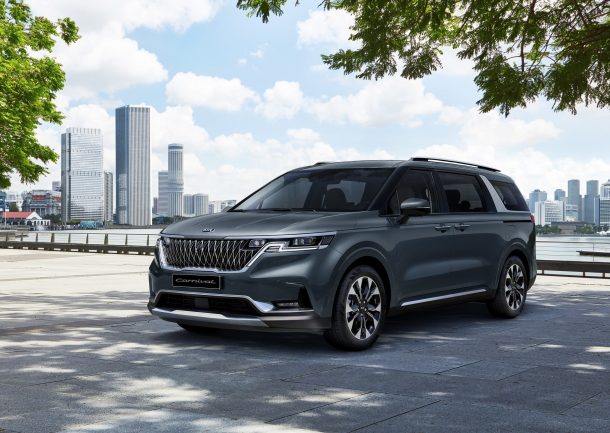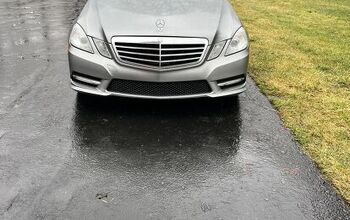QOTD: Hybrid Versus Conventional Drivetrains
Which drivetrain would you prefer: The hybrid two-motor setup that Toyota has paired with their 2.5-liter DOHC four-cylinder that puts out 245 horsepower or Kia’s conventional V6 that produces 294 HP?
These are the drivetrains you’ll find in the new 2021 Toyota Sienna minivan, or the upcoming 2022 Kia Carnival, which won’t be out until sometime this summer.
The Toyota has already been selected the 2021 Family Green Car of the Year for its Hybrid System II that delivers an EPA-estimated 36 combined MPGs. No idea at this time what the Carnival will achieve mileage wise, but the Carnival’s predecessor, the Sedona, gets a combined 21 MPGs, a respectable number that the new model should surpass, although by how much is anyone’s guess.
Complexity of design may be an issue if you keep one of these family wagons beyond the warranty period, which now makes it your problem if a mechanical breakdown occurs. Toyotas have achieved remarkable longevity, and their reliability and dependability are among the top reasons for their popularity. Kia has also done very well improving their durability, so this one’s sort of a wash. I’d go with the Kia simply for the number of moving parts, and their availability five, maybe ten years down the road.
If you’re someone that doesn’t keep vehicles for very long, complexity and parts availability are not your concerns, nor is the owner who will inherit one of these machines. Compare it to the simplicity of a Timex watch, versus that of the current crop of smartwatches, which will tell you everything from the number of calories you’ve burnt while working from home, to your heart rate, and the weather outside. Yes, you may need to wind the Timex each day or replace its battery every year or so. The movement within the Timex may not have been changed as long as you’ve been alive, unlike the smart watch, whose next-gen internals are already being tested, along with which new features should be added.
It’s your call, the internal combustion engine you know, or technology no one but an authorized dealer and their technicians are equipped to handle. Which would you choose?
[Images: Toyota, Kia]
With a father who owned a dealership, I literally grew up in the business. After college, I worked for GM, Nissan and Mazda, writing articles for automotive enthusiast magazines as a side gig. I discovered you could make a living selling ad space at Four Wheeler magazine, before I moved on to selling TV for the National Hot Rod Association. After that, I started Roadhouse, a marketing, advertising and PR firm dedicated to the automotive, outdoor/apparel, and entertainment industries. Through the years, I continued writing, shooting, and editing. It keep things interesting.
More by Jason R. Sakurai
Latest Car Reviews
Read moreLatest Product Reviews
Read moreRecent Comments
- ToolGuy If these guys opened a hotel outside Cincinnati I would go there to sleep, and to dream.
- ToolGuy Michelin's price increases mean that my relationship with them as a customer is not sustainable. 🙁
- Kwik_Shift_Pro4X I wonder if Fiat would pull off old world Italian charm full of well intentioned stereotypes.
- Chelsea I actually used to work for this guy
- SaulTigh Saw my first Cybertruck last weekend. Looked like a kit car...not an even panel to be seen.



































Comments
Join the conversation
How about a hat tip to Freed Mike and I for planting the seed of this discussion???? I'll expand on my point of view, since it is the qtod. It all comes down to the reasons you gave. "Complexity of design may be an issue if you keep one of these family wagons beyond the warranty period, which now makes it your problem if a mechanical breakdown occurs." The current Toyota Hybrid transmissions, like the FWD Ford Hybrid transmissions they are copied from are far and away the simplest transmission on the market. A fixed planetary gear set, a couple of spur gear reductions, two brushless motors and a pair of motor speed sensors. I don't know the exact specifics of the transmission that will be in the new Kia, but I do know it will have at least these components to fail that aren't present in the Toyota. Torque converter Torque converter clutch Torque converter clutch control solenoid Pump Pressure sensor(s) Pressure regulator(s) Shift solenoids Control harness Clutches Servos Hydraulic control circuitry "It’s your call, the internal combustion engine you know, or technology no one but an authorized dealer and their technicians are equipped to handle." Those are the things that fail in an automatic transmission and even a simple repair is far beyond the knowledge and capabilities of most people. Driving any distance with some of those failures will usually lead to complete transmission failure. Yes the Toyota requires an inverter and battery to function but those items like the transmission are covered by the Hybrid system emissions performance warranty which means 8 years and 100k or 10 years and 150k if you live in a state of full Californication. Then you have the engine and the rest of the car and Toyota's track record says out of warranty work is going be be far less likely on it than the Kia. IF I were to buy a Toyota the Hybrid or Plug In Hybrid are the only versions I'd consider since overall they are the most reliable and durable power trains in those vehicles.
As a lay mechanic, I struggle with the notion that "hybrid electric" propulsion is anything more than a sham. Everyone is blindly rushing to get on the green bandwagon, but few ever stop to consider the underlying truth about these subjects, and hybrid is one of those subjects. Consider the fact that over 65% of all electricity in the US comes from, wait for it, fossil fuels. That is even after NGO's and the feds are furiously working to force states into mandating renewable energy which Texas recently learned is anything but reliable. For example, solar only works when the sun is shining which at best is 50% of the time, then there is no way to store the little electricity it generates. Wind is even less reliable as the wind is intermittent at best, plus without government subsidies that artificially reduce the cost to somewhere near fossil fuel produced electricity, wind would not in any way be competitive economically. This approach is almost totally driven by government fanatics who demand that we accept their green agenda regardless of whether it is economically sound. ETOH, or ethanol, is another example as it costs more energy to produce one gallon of ETOH than that gallon contains, even before discounting the value due to low Btu and combustion inefficiency. So back to hybrids that mostly rely on fossil fuels to produce the electricity required to power the electric motors. It becomes even more absurd when you consider that large commercial equipment such as ships, tugs, and railroad engines use, you got it, a second engine fueled by the evil DIESEL fuel to power a generator that then produces the electricity to run the electric motor! In effect, hybrid proponents claim to be efficient is ludicrous given the fact that they have to run TWO engines, not one, both of which run on fossil fuels! So my conclusion that hybrid is a scam will at least be valid until all electricity is produced from renewables which will not happen in the forseeable future. As Texas learned, having NGO's like ERCOT and federal bureaucrats dictating how business must operate has always been and will likely continue to be worse than just inefficient, but disastrous, both economically and practically.